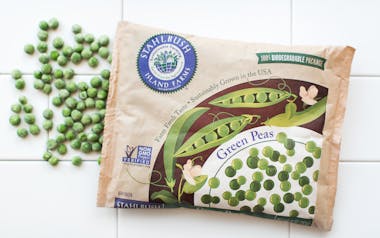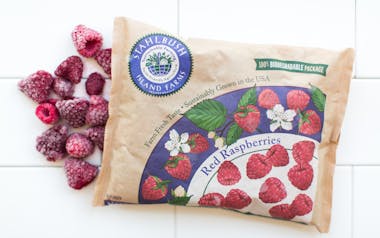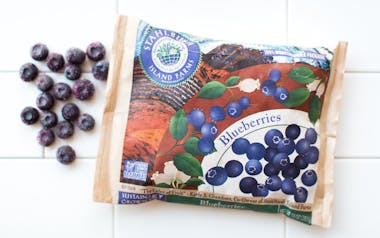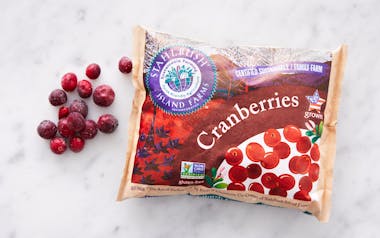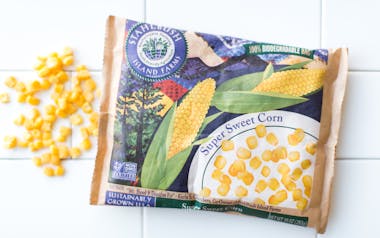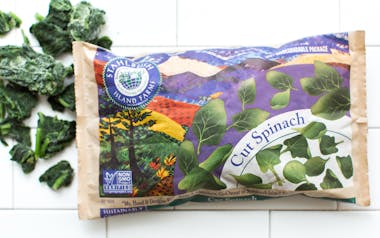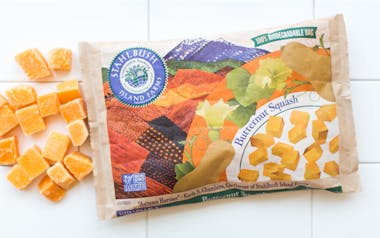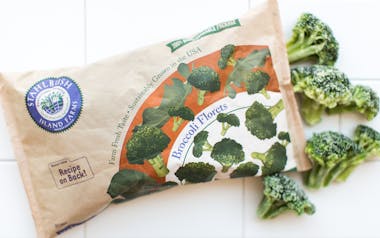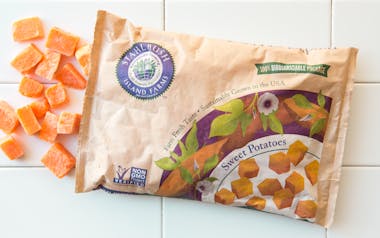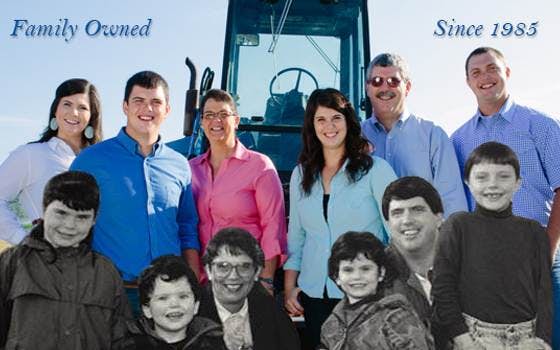
Stahlbush Island Farms
Corvallis, OR
Located in the heart of Oregon's lush Willamette Valley, Stahlbush Island Farms is an environmentally friendly farm and food processor committed to sustainable agriculture. Our philosophy is that farming practices should leave the soil, air, water, plant life, animals and people healthier. For us, sustainability is a continuing journey.
What does it mean to be sustainable? Good question! At Stahlbush, we think it’s important to explain to people what we mean when we use this term to describe our way of farming and producing food. We define sustainable as ���meeting the needs of the present without compromising the ability of future generations to meet their own needs” (based on “Report of the World Commission on Environment and Development,” United Nations, 1987). We like this definition because it shows the quest for sustainability is a philosophy. Our philosophy of sustainability guides our farming practices and affects the way we use energy and care for soil, water, people and wildlife.
Soil: The soil at Stahlbush Island Farms is alive with sunshine and rain and living organisms. Soil is the lifeblood of the farm. We know the only way we can truly be sustainable farmers is to make the soil healthier through our farming methods year after year. At Stahlbush, we use conservation tillage to reduce erosion and increase the organic matter, cover crops to return nitrogen to the soil, annual soil tests to guide our crop-specific nutrient management programs and rubber tracks or wide tires wherever possible to reduce soil compaction. As in the human body, a capillary system exists in the soil to move water and nutrients throughout. We work to develop farming practices that leave this system as undisturbed as possible, because healthy soil makes healthy plants that are better equipped to fight off pests like fungus, insects and disease.
Water: We strive for the most efficient irrigation possible. From a technical standpoint, we use drop tubes on our linear and pivot irrigation systems to reduce water losses due to evaporation and drift. We also use drip irrigation to provide water directly to the crop root zone. We continue to improve our irrigation scheduling techniques, using weather, soil moistures and evapo-transpiration data to track water use and needs. In our processing plants, we measure our current daily water use during production and clean up and look for ways to save water. Keeping equipment, such as hoses, nozzles and valves, in good condition helps us manage water use. We also sweep and collect waste without using water and communicate water use metrics to production personnel to keep the whole team focused on our reduction goals. At Stahlbush, water is a natural resource we’re taking care of. And we’re always looking for ways to do more with less.
People: The effort and skill that our employees put forth is instrumental to all of our efforts at Stahlbush. As we work to contribute to the communities in which we farm, we realize the importance of creating a range of employment opportunities. We value contributions to the team while honoring every individual. We are absolutely committed to safe and fair working conditions, so much so that we have sought and achieved third-party certification of our labor practices. This helps us maintain the highest standards as we strive to continually improve the lives of the people who work at the farm. To learn more please visit The Food Alliance.
Innovation: Stahlbush sees innovation as a key tool to improve soil, energy use, water, biodiversity and food safety. We are constantly looking for innovative ways to use technology and will continue incorporating creative, sustainable ideas into our farming practices. For example, in 2010, Stahlbush will introduce the first biodegradable bag in frozen fruits and vegetables. And, using GPS-guided tractors, we are able to cultivate with ever-increasing accuracy, reducing synthetic farm inputs and diesel fuel usage. We can also perform some of our farming activities 24 hours a day, making better use of our equipment and running fewer total tractors. From building the first-of-its-kind biogas plant in North America to creating the first-of-its-kind biodegradable bag in frozen fruits and vegetables, Stahlbush Island Farms is a leader in putting innovation in the service of sustainability.
Biodiversity: At Stahlbush, we farm with nature. Here in the Willamette Valley, the abundant wetlands, rivers and rich soils that make such good farming also attract a wide variety of wildlife. To protect riparian areas, we create a healthy, natural flora buffer to prevent runoff and provide wildlife habitat. Our Heron and Egret rookery is a nice example of a mutually beneficial relationship with our local wildlife neighbors. Every year, two large colonies of Great Blue Herons and Great White Egrets nest in a stand of tall Cottonwood trees right across from some of our largest organic and sustainably farmed fields. During the wet winter and spring, the river delta provides nutrient-rich sediment. In the hollows, Great Blue Herons and Egrets forage on frogs and fish left behind as the river recedes. The organic and sustainable fields offer a safe and abundant food source for these beautiful birds, and their hunting keeps the fields relatively free from mice and frogs, protecting crops and finished food products. Our wildlife neighbors include eagles, hawks, fox, beaver and deer, and every year dozens of species of migrating birds and waterfowl make a stopover here for food and rest, and we look forward to seeing them.
Energy: Stahlbush Island Farms, a national leader in sustainable agriculture and food production, operates a first-of-its-kind Biogas Plant by producing electricity from fruit and vegetable byproduct. The power plant will provide enough electricity for approximately 1,100 homes, nearly twice what the farm and food processing plant uses in a year. The $10 million dollar project took fourteen months to complete and is operated by Stahlbush Island Farms Inc. The cutting-edge Biogas plant supports Stahlbush Island Farms’ goal of minimizing its carbon footprint and gaining energy independence through the creation of a renewable, on-farm energy source. A recent innovation in the United States, and most commonly associated with dairy operations, anaerobic digesters have been creating green energy in Europe for decades. This is the first plant in North America, built with state of the art engineering and design techniques for the purpose of creating biogas from fruit and vegetable by-product.
What does it mean to be sustainable? Good question! At Stahlbush, we think it’s important to explain to people what we mean when we use this term to describe our way of farming and producing food. We define sustainable as ���meeting the needs of the present without compromising the ability of future generations to meet their own needs” (based on “Report of the World Commission on Environment and Development,” United Nations, 1987). We like this definition because it shows the quest for sustainability is a philosophy. Our philosophy of sustainability guides our farming practices and affects the way we use energy and care for soil, water, people and wildlife.
Soil: The soil at Stahlbush Island Farms is alive with sunshine and rain and living organisms. Soil is the lifeblood of the farm. We know the only way we can truly be sustainable farmers is to make the soil healthier through our farming methods year after year. At Stahlbush, we use conservation tillage to reduce erosion and increase the organic matter, cover crops to return nitrogen to the soil, annual soil tests to guide our crop-specific nutrient management programs and rubber tracks or wide tires wherever possible to reduce soil compaction. As in the human body, a capillary system exists in the soil to move water and nutrients throughout. We work to develop farming practices that leave this system as undisturbed as possible, because healthy soil makes healthy plants that are better equipped to fight off pests like fungus, insects and disease.
Water: We strive for the most efficient irrigation possible. From a technical standpoint, we use drop tubes on our linear and pivot irrigation systems to reduce water losses due to evaporation and drift. We also use drip irrigation to provide water directly to the crop root zone. We continue to improve our irrigation scheduling techniques, using weather, soil moistures and evapo-transpiration data to track water use and needs. In our processing plants, we measure our current daily water use during production and clean up and look for ways to save water. Keeping equipment, such as hoses, nozzles and valves, in good condition helps us manage water use. We also sweep and collect waste without using water and communicate water use metrics to production personnel to keep the whole team focused on our reduction goals. At Stahlbush, water is a natural resource we’re taking care of. And we’re always looking for ways to do more with less.
People: The effort and skill that our employees put forth is instrumental to all of our efforts at Stahlbush. As we work to contribute to the communities in which we farm, we realize the importance of creating a range of employment opportunities. We value contributions to the team while honoring every individual. We are absolutely committed to safe and fair working conditions, so much so that we have sought and achieved third-party certification of our labor practices. This helps us maintain the highest standards as we strive to continually improve the lives of the people who work at the farm. To learn more please visit The Food Alliance.
Innovation: Stahlbush sees innovation as a key tool to improve soil, energy use, water, biodiversity and food safety. We are constantly looking for innovative ways to use technology and will continue incorporating creative, sustainable ideas into our farming practices. For example, in 2010, Stahlbush will introduce the first biodegradable bag in frozen fruits and vegetables. And, using GPS-guided tractors, we are able to cultivate with ever-increasing accuracy, reducing synthetic farm inputs and diesel fuel usage. We can also perform some of our farming activities 24 hours a day, making better use of our equipment and running fewer total tractors. From building the first-of-its-kind biogas plant in North America to creating the first-of-its-kind biodegradable bag in frozen fruits and vegetables, Stahlbush Island Farms is a leader in putting innovation in the service of sustainability.
Biodiversity: At Stahlbush, we farm with nature. Here in the Willamette Valley, the abundant wetlands, rivers and rich soils that make such good farming also attract a wide variety of wildlife. To protect riparian areas, we create a healthy, natural flora buffer to prevent runoff and provide wildlife habitat. Our Heron and Egret rookery is a nice example of a mutually beneficial relationship with our local wildlife neighbors. Every year, two large colonies of Great Blue Herons and Great White Egrets nest in a stand of tall Cottonwood trees right across from some of our largest organic and sustainably farmed fields. During the wet winter and spring, the river delta provides nutrient-rich sediment. In the hollows, Great Blue Herons and Egrets forage on frogs and fish left behind as the river recedes. The organic and sustainable fields offer a safe and abundant food source for these beautiful birds, and their hunting keeps the fields relatively free from mice and frogs, protecting crops and finished food products. Our wildlife neighbors include eagles, hawks, fox, beaver and deer, and every year dozens of species of migrating birds and waterfowl make a stopover here for food and rest, and we look forward to seeing them.
Energy: Stahlbush Island Farms, a national leader in sustainable agriculture and food production, operates a first-of-its-kind Biogas Plant by producing electricity from fruit and vegetable byproduct. The power plant will provide enough electricity for approximately 1,100 homes, nearly twice what the farm and food processing plant uses in a year. The $10 million dollar project took fourteen months to complete and is operated by Stahlbush Island Farms Inc. The cutting-edge Biogas plant supports Stahlbush Island Farms’ goal of minimizing its carbon footprint and gaining energy independence through the creation of a renewable, on-farm energy source. A recent innovation in the United States, and most commonly associated with dairy operations, anaerobic digesters have been creating green energy in Europe for decades. This is the first plant in North America, built with state of the art engineering and design techniques for the purpose of creating biogas from fruit and vegetable by-product.
